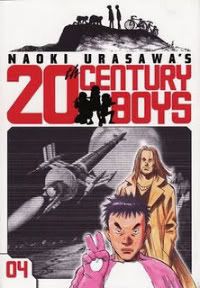 20th Century Boys, Vol. 4: Love and Peace
20th Century Boys, Vol. 4: Love and PeaceStory and Art: Naoki Urasawa
Published By Viz; $12.99 US
Some months ago I decided that since my local libraries had become very manga-friendly over the past few years, it offered a great opportunity to explore more manga and see what I liked. I grabbed as many first volumes as I could, and Naoki Urasawa's 20th Century Boys is one of the series that most impressed me. I've been making my way through the series, but at a pace dictated by my library's Hold Request list.
20th Century Boys follows a group of grown friends trying to save the world from an apocalypse plan they unwittingly set into motion as children. Kenji, the main character, imagined a story of destruction involving plagues, bombs and giant robots that would eventually be foiled by a group of heroes, and wrote it all down in a spiral-bound notebook hidden in a "secret headquarters" (i.e. a spot in a field hidden by some vegetation). Now, working at a grocery store and never having realized his dreams of rock stardom, a disillusioned Kenji eventually realizes that one of his former classmates has taken his fantasy and turned it into a terrorist reality. A mysterious guru known only as The Friend is brainwashing people all over Japan and has infiltrated the government. Strange illnesses are popping up in the same cities Kenji wrote down, and in the same order. As soon as Kenji starts trying to learn the identity of The Friend and stopping the coming disasters, his business is burnt to the ground and The Friend's brainwashed followers try to kidnap his baby niece.
The third volume ended cryptically. After Kenji rescued his family from the Friend's goons, the focus of the story shifted to Thailand to a long-haired, overcoated hero calling himself Shogun. I'm not really sure yet completely what his deal is and I'm not sure I'm supposed to. He's some kind of vigilante-for-pay/"fixer" or "cleaner." He does certain things for pay like saving tourists from muggers, but he also frees girls from sex slavery.
The majority of the Love and Peace follows Shogun's adventures in Thailand. Shogun is dogged by a local crimelord's thugs for burning a cache of drugs and at the same time runs afoul of the machinations of The Friend. After an actual friend is murdered, Shogun follows clues into the jungle where he finds one of The Friend's lieutenants and a way to strike back. In the meantime we see flashbacks of a younger Shogun trained by a monk in combat, and eventually learn that Shogun is one of Kenji's former classmates. Shogun reunites with Kenji in Japan towards the end of Love and Peace, and we learn Kenji has been driven literally underground. Kenji, his mother, and his young niece Kanna are living in an abandoned train tunnel while Kenji works dressed as a bunny holding advertising placards for sensual massage. In the years that have passed between Kenji's store burning down and Kenji and Shogun reuniting, Kenji has practically become the Osama bin Laden of Japan, with Wanted posters calling for his head all over the country.
The first thing 20th Century Boys reminded me of was Stephen King's It. Like It, Urasawa gives us a group of little kids who grow up to have to face an evil they first encountered in childhood. There's something very appealing about that idea. Emotionally, it gets you in both directions. It hugs your inner child with nostalgia and at the same time makes it easy to relate to the grown up Kenji (except for all you folks who grew up to be precisely who you knew you were going to be). It works with your perhaps buried - or maybe at least dusty - childhood fantasies that you would one day be your own Superman and save the world. And I think it also touches a kind of dreamy notion I imagine a lot of us have, or at least want to have, that in some way - and maybe not even a way that brings up more good feelings than bad - we will never be more connected than we are to the people who sat in desks with us in grade school.
20th Century Boys is an epic suspense thriller and probably one of the most accessible manga I've come across. A lot of the confusion I experience with certain manga, which I usually blame on simple cultural distance, isn't a problem at all in 20th Century Boys. In some ways, Urasawa's art reminds me more of Western comics than that of other manga. If you're as new to manga as me, it's a great book to start out with.

No comments:
Post a Comment